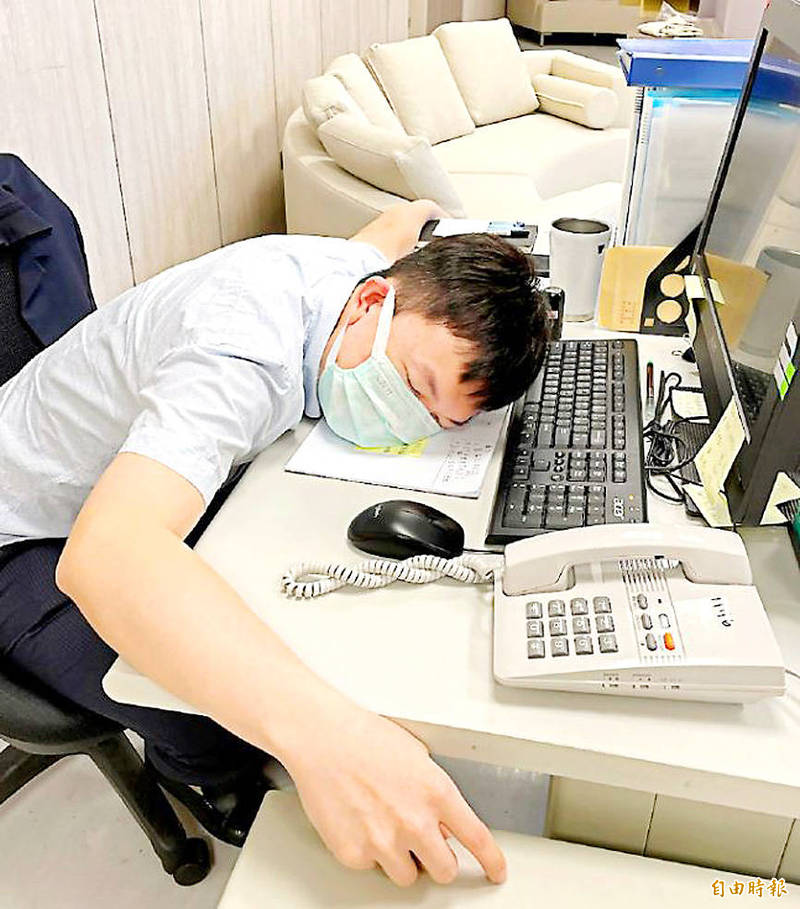《TAIPEI TIMES》Youth taking more antidepressants

A man rests his head on his desk in an undated photograph.Photo: Liao Hsueh-ju, Taipei Times
MENTAL HEALTH AWARENESS: The trend is inevitable given modern lifestyles, but young people tend to seek medical help more than older people, an official said
By Wu Liang-yi and Liu Tzu-hsuan / Staff reporter, with staff writer
The number of people under the age of 30 in Taiwan taking antidepressants increased 16.1 percent in 2020 from a year earlier, the National Health Insurance 2020 Gender Statistical Report found.
The number of people taking antidepressants has been increasing since 2011, and reached 1,468,716 in 2020, up 5.1 percent from 2019, said the report, which was released in May.
The number of women using antidepressants always far exceeds that of men, it said.
The growth rate stabilized after 2017, but a year-on-year increase in people taking antidepressants can be seen in all age groups, especially those under the age of 30, it said.
Since 2019, the number of people over the age of 65 using antidepressants has exceeded the number in the 51-to-65 age group, the report showed.
The number of people taking antidepressants used to be the lowest among those younger than 30, but they surpassed people in the 31-to-40 age group for the first time in 2020, with a total of 188,624.
Antidepressants are only available on prescription in Taiwan.
Department of Mental and Oral Health Director-General Chen Li-chung (諶立中) on Sunday said that the trend might be related to anxiety among young people, as antidepressants are often prescribed to relieve symptoms of anxiety.
The growth of antidepressant use is inevitable, as people nowadays are under increasing stress due to societal changes, interpersonal relationships and work, Chen said.
For example, when the COVID-19 pandemic first struck Taiwan in 2020, significant changes in work and life took a great toll on young people, more of whom started taking antidepressants, as they tend to be more aware of their mental health and seek medical attention more than older people, he said, adding that more in-depth research is needed to establish the actual causes of the trend.
Hsu Cheng-dien (許正典), a doctor at Taiwan Adventist Hospital’s psychiatry department, said many people in their 20s encountered serious obstacles caused by the pandemic shortly after they first entered the workforce, especially those in the tourism and hospitality industry.
Others might have planned to study abroad, but were unable to do so as COVID-19 vaccines were not available at the time, so it is understandable they were stressed and dejected, he said.
Frustration at work, unstable income and a lack of fulfillment are likely to influence relationships between couples, as more conflicts can arise if negative emotions are not handled properly, he said.
Parent-child relationships might also have suffered during the pandemic when parents’ hopes for their children to land a good job were unfulfilled, he added.
As for geriatric depression, elderly people are not used to expressing their feelings and tend to view people with depression negatively due to the stigma that mental illnesses once carried, said Tsai Meng-hsiu (蔡孟修), a doctor at Chi Mei Medical Center’s Department of Geriatrics and Gerontology.
Nevertheless, thanks to growing awareness more older people with depression are willing to receive treatment, he said.
The symptoms of geriatric depression include insomnia, loss of strength or appetite, dizziness and chest tightness, while more serious symptoms include forgetfulness and restlessness, which can be mistaken as dementia, Tsai said.
He said that elderly people with these symptoms should adjust their lifestyle by being more physically active and complete simple daily chores by themselves as much as possible.
If a doctor thinks medication is required, a minimum dose would be given at first and adjusted based on the person’s condition, he said, adding that elderly people might need higher doses or longer treatment than young people.
It is also crucial for people to keep elderly family members company, listen to them and show empathy toward them, Tsai said.
新聞來源:TAIPEI TIMES













